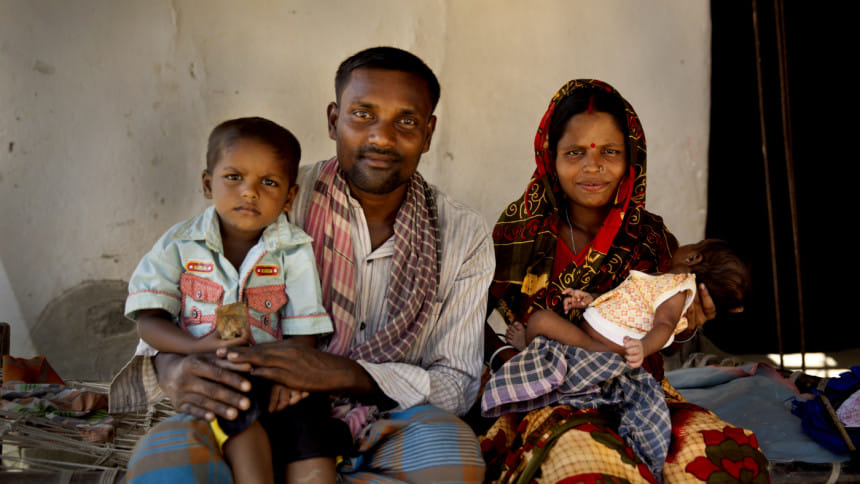Have we kept the promise of reproductive rights?

Twenty-five years ago, in 1994, representatives of 179 countries, along with civil society organisations and many other actors, came together in Cairo at the International Conference on Population and Development (ICPD), sparking a radical shift in reproductive health.
For the first time, individual reproductive rights and choices—with a special focus on those of women—were fixed at the heart of the population and development conversation, including emphasising the right to make free decisions on if and when to start a family, with whom, and if and when to have children, and how many.
Recognising the centrality of sexual and reproductive health and rights (SRHR)—and linking these firmly to human rights and gender equality—governments and other stakeholders put the needs and aspirations of people first, moving away from an earlier emphasis on population targets to control fertility amid fears of the time of overpopulation. By so doing, the ICPD Programme of Action provided a practical and aspirational roadmap towards, and intimately linking together, sustainable development, prosperity, and gender equality.
This week, 25 years later, representatives from the world will meet again at the Nairobi Summit on November 12-14, taking stock of progress towards the commitments, and reenergising to finish any outstanding agenda. The non-binding Nairobi Statement, as well as the original Programme of Action, reflects the inextricable links among women's empowerment, sexual and reproductive health and sustainable development, and therefore calls for greater domestic and international funding for programmes that enable women to decide whether, when or how often to become pregnant. The Nairobi Statement also reflects the importance of achieving the goals of the Programme of Action as a pathway to achieving the 2030 Sustainable Development Goals.
Remarkable progress has indeed been made in Bangladesh over the past 25 years. The UNFPA considers Bangladesh, in many ways, to be an ICPD champion. But despite the progress made here and around the world over the past quarter century, hundreds of millions of women—including millions in Bangladesh—still need access to comprehensive sexual and reproductive health services and rights, while gender norms and gender-based violence pose significant challenges to the ability of women and girls to freely make fundamental decisions regarding our sexual and reproductive health and rights.
Of particular concern is maternal mortality, which is a key indicator both of the rights of women and the functioning of health systems. Reducing the number of deaths from 495 (per 100,000 live births) in 1994 to 176 in 2015, Bangladesh has undoubtedly made significant strides toward saving lives of mothers, and no woman should fear giving birth. However, progress in maternal mortality has slowed down in recent years. According to the BMMS 2016, 53 percent of births are taking place at home, mostly without skilled birth attendance.
Related to this, Bangladesh's public health system needs to be equipped with proper quality care, and adequate supplies and human resources, if not those who can afford it may increasingly access the private health sector.
Although the contraceptive prevalence rate in Bangladesh has increased over the last decade, it has not yet reached the desired level. In particular, the use of contraception among married adolescent girls is still very low, at 51 percent. The unmet need for family planning is highest among this demographic: 17 percent, compared to 12 percent among women aged 15-49. Neither the contraceptive prevalence rate nor the unmet need for family planning have shown any substantive positive change over the last decade, which makes it abundantly clear that the sexual and reproductive health of women and girls in Bangladesh needs urgent attention; this will also be conducive to women's empowerment, and by consequence, to the country's continued prosperity and growth track.
It saddens me that cases of Gender Based Violence (GBV) are high in the whole world, and alarmingly so in Bangladesh. Women should be and feel safe, all the time, and everywhere. According to the VAW survey report 2015 by the Bangladesh Bureau of Statistics (BBS), 54.7 percent of ever-married women reported some type of violence in the past 12 months; 26.9 percent of ever-married women experienced physical or sexual violence by partner at least once in the last 12 months. The report also reveals that 9.1 percent of ever-married women who have ever been pregnant experienced sexual violence during pregnancy. Non-partner physical or sexual violence among women who have never been married is 35.3 percent.
This high prevalence of GBV reduces the opportunities for women to explore their full potential and make decisions about their own life, including matters of sexual and reproductive health. This, in turn, also affects women's general well-being and also women's participation in the society and economy. Further, it limits women's access to and control over resources. Taken together, radically reducing GBV will further expedite Bangladesh's speedy and sustained growth, on the pathway to graduation from LDC status.
Child marriage, while down somewhat, continues to be prevalent throughout Bangladesh. The high incidence of this harmful practice and its repercussions are a structural constraint to women's autonomy and agency by limiting women's access to education and employment, yielding vulnerability to domestic violence.
Further, the adolescent fertility rate in the country remains 113 live births per 1,000 girls aged 15-19 years, with no significant decrease in decades. This is a matter of huge concern as well.
Bangladesh currently has a large population of young persons, whose potential must be fulfilled if the country is to realise a demographic dividend. But the window of opportunity to make this happen is finite; urgent measures must be taken now to fully invest in young persons to ensure better health and education leading to better wellbeing and jobs, including for girls and women in a gender-equal society.
At the same time, as more women exercise their rights and choices in life, and as fertility falls, the reality of population ageing will also begin to set in, as it has in so many countries in Asia-Pacific and globally. An ageing Bangladesh will be a reality in the not-too-distant future, and Bangladesh needs to start preparing from now—by taking a life-cycle approach to development underpinned by gender equality—beginning with healthy pregnancy and safe childbirth, through a well-resourced childhood and adolescence and onto an optimal adulthood with its childbearing years and, eventually, onto a healthy old age, considering investing in the care economy.
All in all, building on the strengths of the resilient and warm-hearted country of Bangladesh, we will continue supporting an inclusive economy and society where all women and men, the old and the young, people with disabilities, people with diverse identities, ethnic minorities and indigenous peoples, feel, and are, valued and able to contribute to communities, society, and the country.
In the face of current and emerging challenges, we look forward to continue supporting Bangladesh as the country seeks to achieve the ICPD agenda and the 2030 Agenda for Sustainable Development, and by so doing, ultimately ensure that no one is left behind.
Fulfilling these commitments will require individual and collective effort, substantive additional financial investments, both public and private. Using national budget processes, as well as all available and innovative financing instruments and schemes, to do what is in our power to increase domestic resources for sexual and reproductive health programmes to fill the financing gap could be the first step ahead.
To finish the unfinished agenda of ICPD, it will be important to recommit to the aspirations of zero maternal deaths, zero unmet need for family planning, zero violence against women and girls.
Now is the time to make reproductive rights and choices a reality for everyone, everywhere!
Asa Torkelsson is UNFPA Bangladesh Representative.

 For all latest news, follow The Daily Star's Google News channel.
For all latest news, follow The Daily Star's Google News channel. 



Comments